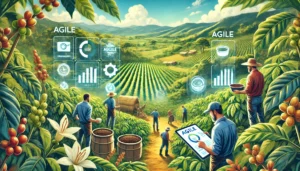Agile project management has revolutionized industries worldwide, and now, it’s transforming coffee production in Honduras. Honduras, one of the largest coffee producers in the world, faces challenges in adapting to market demands, sustainability concerns, and changing climate conditions. By implementing agile project management of coffee internationally in Honduras, the country can enhance productivity, ensure better quality control, and maintain its competitive edge in the global coffee market.
Why Agile is Suited for Coffee Production in Honduras

Agile project management is a flexible and iterative approach originally developed for software development but has since proven beneficial across industries. The agile project management of coffee internationally in Honduras allows coffee producers to break down complex production processes into manageable cycles, known as sprints. This methodology emphasizes collaboration, continuous improvement, and adaptability—qualities essential to coffee production, where weather, market demands, and consumer preferences can shift rapidly.
In the traditional model, coffee production follows long, inflexible cycles from planting to harvesting, processing, and exporting. Agile introduces short, iterative cycles, allowing producers to adapt quickly, make real-time adjustments, and deliver high-quality coffee more efficiently.
The Role of Technology in Agile Coffee Management
Technology plays a crucial role in the agile project management of coffee internationally in Honduras. Farmers and producers can use project management tools to streamline processes, improve communication, and track progress at each stage of production. These tools facilitate collaboration across teams—whether they are managing farms, processing plants, or export logistics.
For example, real-time data analysis can help farmers monitor weather conditions, soil health, and crop growth, allowing them to make timely adjustments. Similarly, technology aids in improving logistics for exporting coffee internationally by tracking shipments and predicting potential delays. By incorporating technology into agile practices, Honduras can ensure smoother operations and respond rapidly to changing conditions.
Agile’s Impact on Coffee Quality Assurance
One of the most significant advantages of agile project management of coffee internationally in Honduras is its ability to improve quality assurance. Coffee production involves several stages where quality can be compromised, such as during harvesting, processing, or storage. Agile focuses on iterative quality checks throughout each stage, ensuring issues are caught and resolved early.
For instance, instead of waiting until the final stage of processing to test for quality, agile encourages regular quality checks after each step—be it drying, washing, or roasting. This allows producers to make necessary adjustments along the way, ensuring that the final product meets the highest standards. With agile, Honduran coffee producers can consistently deliver high-quality coffee to international markets, enhancing their reputation and competitiveness.
Agile in Coffee Farming: Adapting to Changing Conditions
Honduras’ coffee industry faces challenges from climate change, including unpredictable rainfall and rising temperatures, which impact coffee yields and quality. Agile farming techniques provide a solution. By breaking down crop management into short sprints, farmers can assess and adjust their strategies regularly.
For example, agile principles allow farmers to quickly adapt to unexpected changes in weather by adjusting irrigation, fertilizers, or pest control strategies in real time. Farmers may run two-week cycles focused on specific tasks, such as pruning or soil testing. At the end of each sprint, they evaluate results and modify their approach for the next sprint. This real-time adaptation ensures that coffee farms can maintain productivity and quality, even under fluctuating environmental conditions.
Case Studies: Successful Implementation of Agile in Coffee Industry
There are examples of how agile project management of coffee internationally in Honduras has been implemented successfully, improving efficiency and product quality. In Honduras, several small-scale farmers have adopted agile principles to overcome the challenges of unpredictable weather patterns and market demands.
One case involved a cooperative of coffee farmers in the Montecillos region. By adopting agile methods, the cooperative divided their production process into shorter cycles. They used real-time data from local weather monitoring stations to adjust irrigation schedules and pest control measures. As a result, they experienced higher yields, improved coffee quality, and faster time-to-market, demonstrating the effectiveness of agile in the farming sector.
Agile in Coffee Processing: Ensuring Efficiency
Processing coffee beans after harvesting is one of the most labor-intensive steps in the coffee supply chain. Agile project management can optimize this process by incorporating iterative cycles and quality checks throughout. This ensures that any issues are caught early, minimizing delays or quality degradation.
For instance, during the drying stage, producers can test moisture levels at regular intervals to ensure the beans are drying evenly. Agile’s continuous feedback loops allow them to make quick adjustments to drying times or techniques, ensuring the beans are processed to perfection. This approach ensures that the final product meets international quality standards, reducing the risk of product rejection due to inconsistencies or delays.
In the context of agile project management of coffee internationally in Honduras, this step is crucial, as it directly impacts the export quality of coffee to international markets.
Economic Benefits of Agile in Coffee Production
Agile project management offers substantial economic benefits for Honduran coffee producers. By increasing efficiency, reducing waste, and improving responsiveness to market demands, agile enables producers to maximize profitability. For example, by breaking down large-scale production into manageable sprints, producers can identify inefficiencies and rectify them promptly, ensuring smoother operations and minimizing financial losses.
Moreover, the agile framework enables producers to be more responsive to shifts in global coffee prices. Agile supply chains can adjust production and export volumes based on real-time data from international markets, ensuring that producers can capitalize on favorable market conditions and avoid overproduction during periods of low demand.
This flexibility positions Honduras as a leader in coffee production on the global stage, reinforcing the economic importance of agile project management of coffee internationally in Honduras.
Agile in Coffee Distribution: Meeting Global Demands
The global coffee market is highly competitive, and consumer preferences can change rapidly. Agile supply chain management allows Honduran coffee distributors to be more flexible in responding to these shifts. Agile breaks down the distribution process into smaller, manageable tasks that can be adapted to real-time market conditions.
For example, if a sudden increase in demand for organic coffee arises in Europe, Honduran distributors can quickly adjust their shipments and production lines to meet this demand without disrupting other aspects of the supply chain. Additionally, agile enables better communication between farmers, processors, and distributors, ensuring that products move efficiently from the farm to the global market.
Agile and Fair Trade Coffee Initiatives
Sustainability and fair trade practices are becoming increasingly important in the coffee industry. Agile project management allows Honduran coffee producers to meet these demands more effectively. By adopting agile principles, producers can experiment with sustainable farming methods, such as organic fertilizers or shade-grown coffee, on a small scale before fully implementing them.
Agile’s iterative nature ensures that new sustainability practices are both practical and economically viable, allowing producers to make continuous improvements without compromising quality. This not only enhances the environmental sustainability of Honduran coffee but also aligns with fair trade goals, ensuring ethical labor practices and improving working conditions for farmers.
Training Farmers for Agile Project Management
One of the key challenges in implementing agile project management of coffee internationally in Honduras is the need to train farmers and producers. Most traditional farmers are accustomed to long cycles of production, and shifting to agile methods can require a cultural shift.
Training programs can help farmers understand the principles of flexibility, collaboration, and continuous improvement. These programs can focus on how to break down their production cycles into sprints, use real-time feedback to make adjustments, and work more closely with stakeholders throughout the supply chain.
For example, a training program could teach farmers how to use project management tools to track their progress and manage their resources more efficiently. By investing in farmer education, Honduras can ensure that its coffee producers are well-equipped to implement agile practices and succeed in the international market.
Conclusion: The Future of Agile in the Coffee Industry
The agile project management of coffee internationally in Honduras is set to transform the coffee industry by enabling greater flexibility, efficiency, and sustainability. By embracing agile principles, coffee producers in Honduras can overcome the challenges posed by climate change, market volatility, and increasing consumer demand for ethical practices.
As agile continues to gain traction in the coffee industry, it will play a critical role in maintaining Honduras’ competitive edge on the global stage. By focusing on continuous improvement, collaboration, and adaptability, agile ensures that Honduran coffee producers can deliver high-quality coffee while meeting the evolving needs of the international market.
Agile is not just a project management methodology; it’s a way forward for the future of coffee production, ensuring that Honduras remains a key player in the global coffee industry for years to come.


